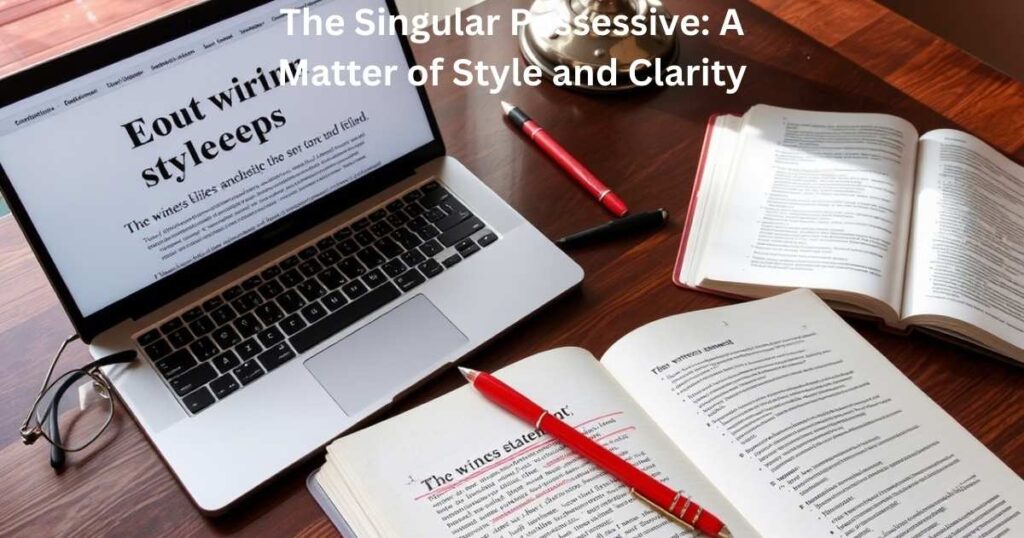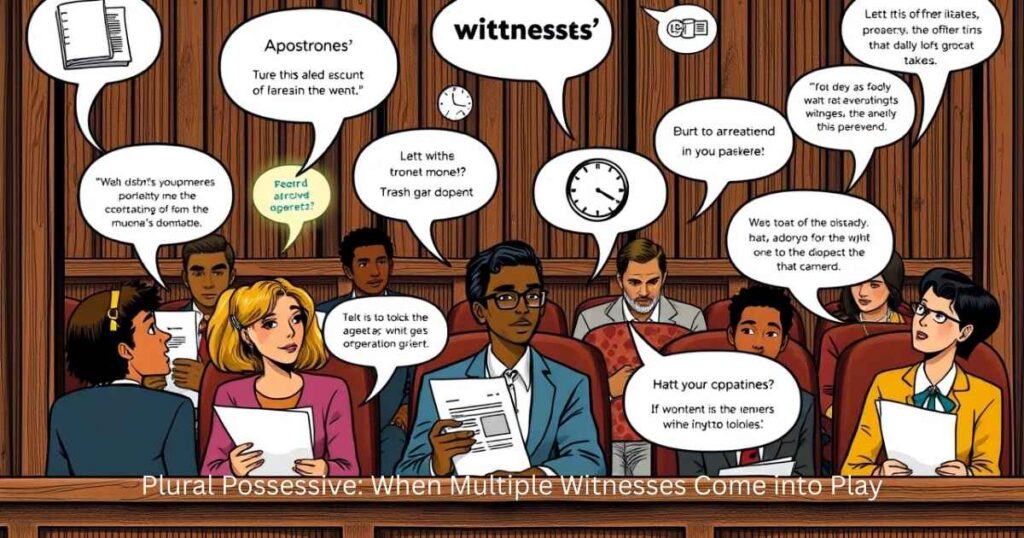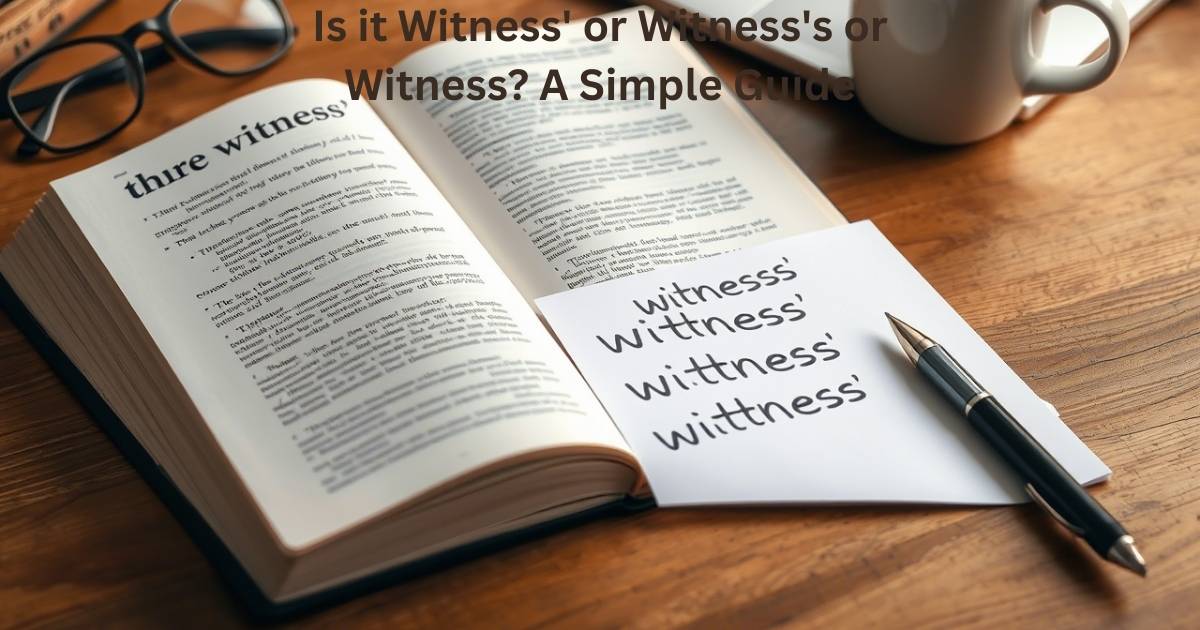Witnesses play a vital role in legal cases, providing important testimony that can shape the outcome of a trial. But when writing about them, many get confused about the correct form to use. Is it Witness’ or Witness’s or Witness? This question often puzzles writers, reporters, and legal professionals alike. The answer depends on understanding singular and plural possessives and following style guides like Chicago or Associated Press.
Getting it right matters because clarity in legal writing, news reporting, and court documents is essential. In this article, we will tackle the tricky grammar behind Is it Witness’ or Witness’s or Witness? You will learn how to use these forms correctly in different contexts. By mastering this, you ensure your writing stays precise and professional. So let’s clear up the confusion once and for all about Is it Witness’ or Witness’s or Witness?
The Singular Possessive: A Matter of Style and Clarity

When using the singular possessive form of a word like witness, both witnesses and witness’ are technically correct. The difference comes down to style. If you follow The Chicago Manual of Style, you’ll add an apostrophe and an “s” even if the word already ends in “s”. That means you’d write a witness’s statement when referring to a single witness. This form is considered more clear and complete by many modern grammarians, especially in legal documents or courtroom settings, where clarity is essential.
On the other hand, if you’re following the Associated Press Stylebook, which is common in news reporting, you’ll just add an apostrophe at the end of words ending in “s”. So in this case, you’d write witness’ testimony. Both forms express ownership, such as a witness’s account of the crime or a witness’s recollection of the events. What matters most is that you stay consistent within your writing style, especially in professional or legal writing.
Read this Also: HY Meaning A Guide to HY Definition & Uses in Text
Plural Possessive: When Multiple Witnesses Come into Play

When you’re dealing with more than one witness, you need to use the plural possessive form. The plural of witness is witnesses, and to show ownership, you simply add an apostrophe after the “s” , witnesses’. For example, if several people gave statements about a crime scene, you’d write “The witnesses’ statements matched in every detail.” This shows that the statements came from more than one person.
This form is especially important in situations involving multiple accounts, such as in trials, police investigations, or when a defense attorney is comparing various affidavits. The rule is simpler here because you don’t add another “s” after the apostrophe. Understanding this part of grammar helps ensure accuracy and clarity when summarizing multiple witness accounts.
Witness Testimony: The Heart of Legal Proceedings
In any legal proceeding, a witness’s testimony can make or break a trial. Whether you’re part of the prosecution, defense, or a public servant like a detective, getting the grammar right ensures there’s no ambiguity in legal statements. A misplaced apostrophe in a witness’s affidavit could lead to misunderstandings or even delays in court.
For example, a witness’s description of a suspect’s appearance might be key evidence. If your report or statement misuses the possessive, it could confuse readers or make the courtroom document look unprofessional. Since witness testimony is often the backbone of the trial process, small errors in writing can have big consequences.
Style Guides: The Arbiters of Grammar
To figure out whether to use witness’ or witness’s, many writers turn to trusted style guides. The two most common in the USA are The Chicago Manual of Style and the Associated Press (AP) Stylebook. The Chicago style recommends always using ‘s even for singular nouns ending in “s,” so you’d write a witness’s statement. In contrast, the AP style tells you to drop the “s” after the apostrophe for those words, recommending witness’ testimony instead.
Which one should you use? That depends on your audience. If you’re working on a legal report, writing a courtroom transcript, or following academic grammar guides, go with Chicago. If you’re writing for news outlets or in journalism, AP style is the way to go. What’s most important is that your writing remains consistent throughout.
Court Cases: Where Precision Matters Most
In a court case, the language used can affect the outcome. That’s why precision matters when using possessive forms. For instance, if an attorney refers to “the witness’s recollection of the confrontation,” it’s clear that the statement comes from one person. But saying “the witness recollection” would sound incorrect and confuse the meaning.
Using the right form can also affect the tone and credibility of legal documents. A judge or jury may subconsciously pick up on unclear or inconsistent language. That’s why prosecutors, defense attorneys, and legal writers alike should understand how to use possessive expressions properly when describing statements, testimonies, and observations.
Every word in a witness’s statement can impact the outcome of a trial.
Legal documents like affidavits and testimony require exact grammar and punctuation.
Misusing a possessive form like witness’ vs witnesses may cause ambiguity in legal interpretation.
Attorneys depend on accurate language to build a solid case in court.
Courtroom arguments often rely on the clarity of statements and written records.
A small error in a statement or description can weaken the evidence presented.
The prosecution and defense both analyze grammar in witness accounts for inconsistencies.
Proper use of style guides like Chicago or Associated Press improves legal writing.
Judges expect language that shows consistency, ownership, and precision.
In a courtroom, the power of testimony lies in how clearly it’s written and spoken.
Testimony Details: Painting a Picture with Words

The way a witness tells a story matters just as much as the facts. The testimony is more than just a summary,it’s a detailed account that can create a mental image for the jury. When you write “the witness’s detailed recollection of the night,” you’re adding personality and specificity to the expression.
A well-written description can help bring a crime scene to life in the courtroom. Details like the suspect’s expression, what they wore, or what they said all matter. And these details need to be presented using correct grammar and punctuation. Writing with clarity, especially in legal writing, ensures that every piece of evidence is understood the way it’s intended.
Apostrophe Use: More Than Just Possession
It’s easy to forget that apostrophes aren’t only used to show ownership. In English grammar, they also show missing letters in contractions (like “don’t” for “do not”) and sometimes to form the plural of letters or numbers. But in the case of witness, we’re mostly concerned with the possessive form.
Knowing how and when to use an apostrophe helps avoid ambiguity in legal proceedings or formal writing. Misusing apostrophes in a witness’s statement might not seem like a big deal, but in a trial, every word matters. Understanding the different roles that apostrophes play supports better overall writing and communication.
Legal Evidence: Beyond Witness Accounts
Testimony is important, but it’s just one piece of the legal evidence puzzle. There are also documents, expert analysis, police reports, and physical evidence to consider. Still, how you refer to this evidence in legal documents must follow grammar rules for it to be taken seriously.
A solid grasp of possessive forms can help describe not just a witness’s statement, but also things like a detective’s sketch, a defendant’s affidavit, or a prosecutor’s argument. In a world where every word is examined under a microscope, using correct grammar builds trust and helps maintain the accuracy of your message.
Language Mastery: A Continuous Journey
Becoming skilled at grammar, punctuation, and style takes time. Whether you’re writing a police report, preparing courtroom documents, or drafting a news article, learning how to use terms like witness’s, witness’, or witnesses’ correctly is part of mastering English communication.
Language isn’t static,it evolves. Even style guides update over time. That’s why it’s important to keep learning and to adapt your writing style to the context you’re in. Treat grammar like a tool that helps you express meaning clearly. When your words are clear, your message carries more power.
Police Investigation: Where Details Matter
During a police investigation, tiny details can unlock the truth. When a detective writes down a witness’s description of a suspect, the report must be precise. A small grammar mistake could create confusion about what was seen or said.
These types of legal statements must be grammatically accurate so that the testimony is reliable in court. Investigators rely on correct language to build a solid timeline, describe events, and help identify the suspect. That’s why learning the correct way to form possessives matters far beyond the page.
Detail Description: The Power of Thorough Accounts
A thorough description in a witness’s statement can shape the entire legal case. Whether it’s about the time someone entered a building or how they behaved during the confrontation, these details offer more than just information,they give insight.
In such contexts, saying “the witness’s timeline” rather than “witness timeline” adds clarity and avoids misinterpretation. Correct grammar reinforces the strength of the testimony and leaves less room for doubt during trial proceedings.
Grammar Insight: Beyond Rules to Understanding

Many people think of grammar as a list of rules, but it’s really about understanding. When you know why a rule exists, it’s easier to use it correctly. This is especially true with possessive forms, which are often about context, not just memorization.
Both witnesses and witness’ can be correct depending on your style guide and your writing context. What matters most is that your expressions are consistent, accurate, and serve the goal of clear communication. That’s the real mastery of language,using it so that your meaning is never in doubt.
Context defines correctness – In grammar, context often determines which form or structure is most appropriate, not just hard rules.
Style guides influence usage – Different stylebooks (like Chicago or AP) may prefer different possessive forms, like witness’s vs witness’.
Possession can have two forms – For singular nouns ending in “s,” both ’s and just ’ are acceptable depending on the writing style.
Plural possessives always end in s’ – When dealing with plurals like witnesses, the possessive form is witnesses’, never witness’s.
Avoid ambiguity with clarity – If one possessive form makes a sentence clearer than another, choose that one, even if both are correct.
Grammar is a communication tool – The goal of grammar isn’t perfection, it’s clear and effective communication.
English evolves – Language usage changes over time, and newer forms often become acceptable due to frequent use.
Consistency matters more than perfection – Whether you choose witnesses or witnesses, keep it consistent throughout your document.
Reading aloud helps catch errors – Listening to your writing can help you spot awkward phrasing or incorrect possessive forms.
Grammar understanding grows with usage – True grammar mastery comes not from memorizing rules, but from using language thoughtfully in context.
Conclusion:
The question of “Is it Witness’ or Witness’s or Witness?” is not just about choosing the right form,it’s about embracing how powerful and nuanced language can be. Understanding grammar, especially in high-stakes settings like the courtroom, police investigations, or news reporting, gives you a professional edge.
Whether you’re a public servant, a writer, or just someone who values strong communication, getting the details right matters. And if you’re looking to celebrate your role, Custom Pins with your title, logos, or encouraging words are a great way to show pride in your service. Let grammar be your tool, not your obstacle. With the right knowledge, every word you write will speak clearly and powerfully.
FAQs
Which is correct, witness or witness’s?
The focus keyword Is it Witness’ or Witness’s or Witness depends on context. Witness shows possession, while witness is just the noun form.
What is the difference between witness and witnesses?
Is it ‘Witness’ or ‘Witness’ or ‘Witness ‘ that often confuses people? Witness is singular; witness means more than one person offering legal or court statements.
How do you make a plural possessive with S?
To form a plural possessive, add only an apostrophe after the s in witnesses. Example: witnesses’ statements. This follows the rule in Is it Witness’ or Witness’s or Witness.
How do I find a witness?
You can locate a witness through police reports, legal documents, or investigations. This matters when asking Is it Witness’ or Witness’s or Witness in real cases.
Is it Witness’ or Witness’s or Witness in legal writing?
In legal writing, Is it Witness’ or Witness’s or Witness depends on your style guide. Witness is preferred by Chicago; AP uses witness’.
Conclusion:
Choosing the right form in Is it Witness’ or Witness’s or Witness can be tricky. But once you know the rules, it gets easier. Both witnesses and witnesses are correct. It depends on which style you follow, like Chicago or AP. Use witness when you’re not showing possession.
In court, writing, or reports, always aim for clarity. When asking Is it Witness’ or Witness’s or Witness, think about your reader. Stay consistent and choose what fits your style guide. The answer to Is it Witness’ or Witness’s or Witness is all about context and grammar style. Just keep it simple, clear, and correct.

Gramcoachpro is your go-to platform for mastering grammar, writing, and communication skills. If you’re a student, teacher, or content creator, we provide easy-to-understand tips, examples, and tools to improve your language — fast and effectively. Our mission is to make better writing simple and accessible for everyone.

